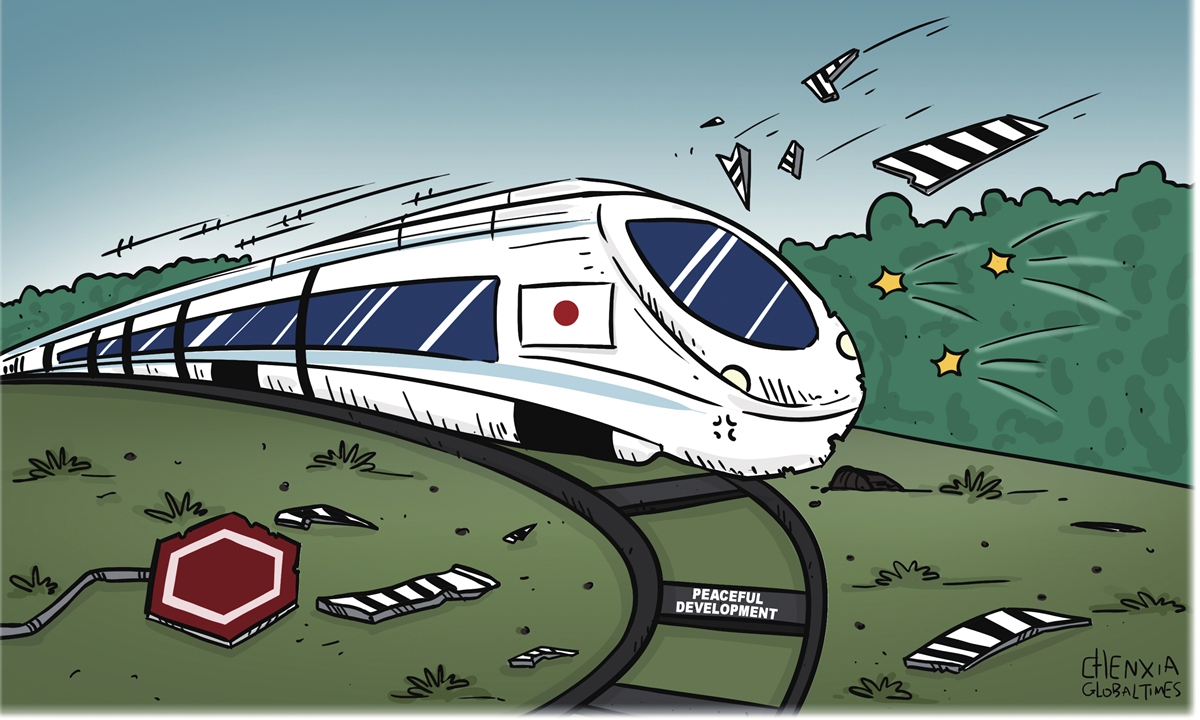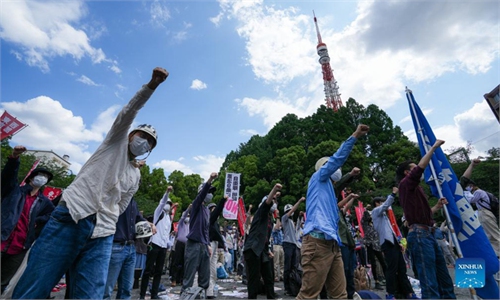Japan’s deviation from peaceful development strategy the greatest threat to itself

Illustration: Chen Xia/Global Times
Japanese Prime Minister Fumio Kishida will not only attend the NATO Summit next week in Madrid, but according to media reports, he is also considering holding a four-way summit with South Korea, Australia and New Zealand on the sidelines of the NATO leaders' gathering, in a bid to promote the vision of a "free and open Indo-Pacific." The Japanese government has recently gone further in terms of ramping up defense input, developing offensive military capabilities, and interfering in the Taiwan question.
The biggest threat encountering Japan today is not so much from the external security environment, but rather from its deviation from national strategy, which mainly refers to Japan's departure from the track of peaceful development under the postwar pacifist constitution and adopting a military-diplomatic strategy of associating with distant countries and attacking close ones.
First, one of the major changes of Japan's diplomacy since former prime minister Shinzo Abe took office has been the gradual integration of diplomacy and security. It is the Japanese Ministry of Defense, rather than its Ministry of Foreign Affairs, that extensively and actively engages in diplomacy. Although the two have different tasks, it is difficult to see the essence and full picture of Japan's diplomacy, especially its policy toward China, if we don't look at its military security.
Second, seeking constitutional revision internally and achieving geostrategic checks and balances with China through a "free and open Indo-Pacific" externally has been the main goals of Japan's national strategy. Kishida's cabinet inherited its goals from Abe, and those supporting the constitutional revision in the Liberal Democratic Party have gained the upper hand. Once achieved, Japan will be able to militarily cooperate with others in arms exports and joint warfare, which will not be allowed by the peace-loving people of Japan.
Japan's foreign strategy has shifted to building paramilitary alliances with more countries with the Japan-US alliance as the core, taking advantage of the contradictions between China and the US, openly intervening in the Taiwan Straits, and the East and South China seas, and "calling on all countries to jointly clamp down on China" in military terms.
Japan's national strategic goals were not set simply by following the US. In fact, Japan was a pioneer in creating the concept of the Quad that now consists of the US, Japan, Australia and India. In 2016, Abe formally proposed the so-called "free and open Indo-Pacific" strategy to hedge against the Belt and Road Initiative. In 2017, the US formulated the Indo-Pacific Strategy against China. Now the so-called Indo-Pacific region has been identified by the Biden administration as the core of its strategy.
As an upgraded version of Japan's Indo-Pacific strategy, the new national security strategy to be introduced within the year may propose welcoming NATO military forces into the "Indo-Pacific," thus forming an alliance between the US, Japan and Europe against China, Russia and North Korea, and attempting to include ASEAN and South Korea.
Japan will also decide to have "counterattack capability," and further break the constitutional limitations by increasing the ratio of defense spending to GDP from 1.24 to 2 percent within five years. This will be a dangerous and unsustainable path of high cost and low security for Japan's national security.
Third, on issues related to Taiwan and the Diaoyu Islands, Japan is by no means just following the US, but actively exploiting the strategic contradictions between China and the US to make profits. Some people in Japan expect that China and the US would collide head-on on the Taiwan question, therefore both would lose while Japan would benefit.
On the issue of the Diaoyu Islands, Japan has taken the initiative to bring the US in to help defend it, with the intention of drawing the US to the side with Japan on the sovereignty of the islands and forcing China to back off. The US certainly does not want to be led by Japan, but inevitably falls into the logic of hegemony and uses Japan as its biggest helper to counterbalance China. The US thus even contributes to Japan's national strategic transformation and armament expansion.
The author is vice dean of the Institute of Modern International Relations at Tsinghua University. opinion@globaltimes.com.cn

